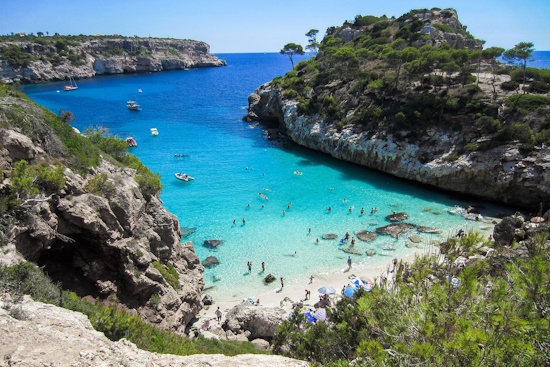For decades, the British tourist market has been considered extremely price-sensitive, while the German one is less so. However, economic pressures in Germany and rising prices seem to be changing the situation. Despite concerns expressed for 2023 and 2024, German tourist arrivals in the Balearic Islands not only did not fall, but also increased by 7% in 2023 and 9% in 2024, with the total number exceeding five million for the first time.
Mallorca absorbed 93% of German visitors, a historical record. Correspondingly, the United Kingdom sent 3.6 million tourists to the Balearic Islands, with 64% visiting Mallorca – a distribution that reflects different patterns of travel behavior.
The importance of these two markets is of strategic importance for tourism in the Balearic Islands. However, excessive dependence on them is also considered a weakness. The gradual diversification of markets has been an objective in recent years, partly due to the decline in British visitors since 2024. Now, the same trends are appearing in the German market.
According to the data, in May and June 2025, German tourist arrivals fell, confirming the concerns expressed since the beginning of the year. Industry professionals estimate that the figures for July and August will consolidate the picture of a slowdown.
Spain’s national tourism organization, Turespaña, had warned before the start of the season that German bookings to the Balearic Islands – and especially to Mallorca – were showing a sharper decline than any other Spanish region.
“German demand appears to have reached its limit in terms of its tolerance for price increases, after two years of significant increases in packages, flights, hotels, car rentals and other services,” the organization noted, adding that while the volume of arrivals will remain significant, it will now be more vulnerable to price trends.
At the ITB travel fair in Berlin last March, tour operators noted increased interest from Germans in cheaper destinations as an alternative to the “new luxury Mallorca.” Although protests against overtourism are said to have had some effect, the president of the Balearic Islands’ travel agents’ association, Pedro Fiol, attributes the decline mainly to prices. “There are signs of fatigue in the main markets. The supply is not adapting to the needs of the core customers,” he said, noting the growing sensitivity to prices in the Spanish market as well.
Despite the decline from Germany and the UK, the overall foreign tourism figures for June showed a 3% increase. The “winners” in percentage terms were France and Italy (over 30% increase), as well as the Scandinavian countries (over 40%). However, these markets remain small in absolute terms: the largest, France, sent around a third of the tourists arriving from Germany and the UK in June.
- This year’s development shows that, even for a destination as strong as Mallorca, stability is not a given when dependence on two main markets remains high.
